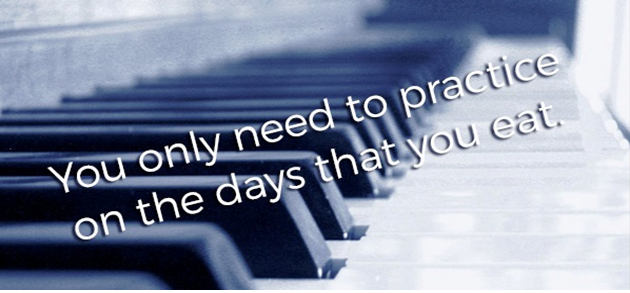|
That’s crazy!” …some of my students say when I answer the question, “how much should I practice each week” ?
“But, I eat every day!” they exclaim. By the time we get to this point in the conversation we’re laughing and they’re starting to digest exactly what I mean when I say, “practice only on the days you eat”. In an ideal world, every piano student would be able to sit down at their piano and practice each day. Why? Because this is the best way to develop a solid foundation of technique so you can advance in the types of music and pieces you’ll be able to play, and you’ll enjoy your piano playing more! Muscle memory is a term used to describe our body’s ability to learn how to do something. There are basically 3 phases that our minds and bodies go through when learning something new: "The cognitive phase, where we are first learning a piece and take each note very slowly making sure our fingerings are correct, our rhythm and key signature are right, and that we’re playing all of our notes right with both the left and right hands. " The associative phase, where we are starting to make sense of the whole piece and can play the notes without having to think about each single one but can play as more of a set of phrases. " The autonomous phase, where we are finally able to play the piece without thinking about the notes at all. It’s as if our fingers play them automatically and we can focus much more on the musical expression of the piece. So what does this mean for your practicing? " First, it means that if you set up a small segment of time to apply to your piano practice each day, instead of doing one or two days of long practice sessions, you’ll learn your pieces better and faster. Ten minutes - 5 days per week will train your brain and your muscles much better than sprint practice sessions one or two times during the week. "Second, the actual strength of your finger, wrist, arm and shoulder muscles will strengthen just as if you were working out in a gym; and the benefit of this on your playing is that you’ll be able to play faster notes correctly and with a better tone! "Third, and perhaps most importantly, you’ll move into a different space with your pieces, where you are able to work on the musical expressions in the piece without being held back by technical challenges, and you’ll enjoy an emotional connection to your playing that you couldn’t have had, without going through the cognitive and associative stages of learning your music. While I realize that everyone’s situation is unique and some people can’t realistically sit down to practice their piano every day, I wanted to show you just a few of the benefits of daily practice, and why it is so beneficial. The best way to approach practicing is to adjust it to your own personal goals for why you are studying the piano in the first place. Use your practice time as a way to personally challenge yourself, and see what happens if you practice 5 days this next week for 10 – 15 minutes. If you’re having challenges in knowing how to set up your practice times, please post them in the comments section. I’d love to hear what happens when some of you try this approach so feel free to share your results! __________________________________________________________________________________________________________________________________ Stay Connected to LessonsOnTheWeb and Learn Much More! LessonsOnTheWeb Academy: High Quality Music Classes LessonsOnTheWeb Official Twitter: @LessonsOnTheWeb LessonsOnTheWeb Official Facebook: Free Videos, and Offers |
AuthorMost blogs written by Archives
June 2020
Categories
All
|


 RSS Feed
RSS Feed